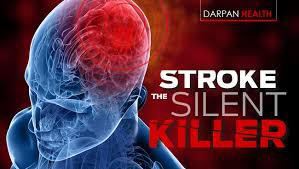 ATC
ATC

Silent strokes occur when small blood vessels in the brain become blocked or rupture, interfering with the brain's ability to produce the mood-regulating chemicals serotonin and norepinephrine.
Silent strokes don't result in classic symptoms (severe headache, dizziness, loss of motor skills), but are often the precursor to full stroke.
Older people who show signs of sudden depression, such as apathy or loss of interest in usual activities, should be closely monitored by their doctors.
Unfortunately, one in three people do not recognize the symptoms quickly enough to benefit fully from state-of-the-art diagnostic methods and treatments for stroke.
If you—or someone you know—suffers a stroke, your response time in seeking medical treatment can mean the difference between full recovery and permanent disability or death.
CAUSES OF STROKE
A stroke can be described as a "brain attack" because it occurs when the flow of blood (and the oxygen it carries) to the brain is interrupted. As a result, body functions controlled by these oxygen-deprived brain cells may be weakened or lost.
Ischemic Stroke
These are the more common type of stroke. Here, a blood clot blocks a blood vessel, usually an artery. It is typically painless but causes weakness, paralysis or loss of sensation on one side of the body, loss of vision in one eye, sudden confusion, trouble speaking or understanding and/or staggering or inability to walk.
Hemorrhagic Stroke
This is rarer and more dangerous. Here, a blood vessel bursts, leaking blood into the brain or surrounding area. This usually causes a severe headache, difficulty breathing, nausea and/or vomiting.
PREVENTING A STROKE
Eat a diet that is low in fat.
Exercise regularly.
Eliminate risk factors such as being Overweight and smoking.
See a doctor on a routine basis for blood-pressure checks. Seek regular treatment if you have medical risk factors, such as diabetes or heart disease.
Don't take oral contraceptives if you smoke. If you live with a smoker, consult your doctor to determine whether contraceptives are safe for you.
Avoid over-the-counter diet pills. Most contain ingredients that increase the risk of stroke.
Treatment for stroke is most effective when administered within six hours of the onset of symptoms. Seek help immediately if you experience unexplained weakness on one side of the body... loss of vision or double vision... difficulty speaking... numbness on either side of the body... severe dizziness or loss of balance.
EVERY MINUTE COUNTS
If you experience or witness even one stroke symptom, seek medical attention immediately. Stroke victims may be unable to speak to medical personnel, but a family member or friend can help ensure proper care.
An up-to-date list of all medications the patient takes is crucial for appropriate stroke treatment. Put the patient's medications in a paper bag and take it to the hospital.
Take the patient to the nearest hospital.
After discharge from the Hospital notify a physician if the stroke patient develops a fever of 101°F/38.3 or higher. This can be a sign of infection or another serious complication.
NOTE: Up to 30% of stroke patients develop depression. Signs include persistent sadness and/or changes in sleep habits or appetite. Such patients should consult a psychiatrist or other experienced psychotherapist.
